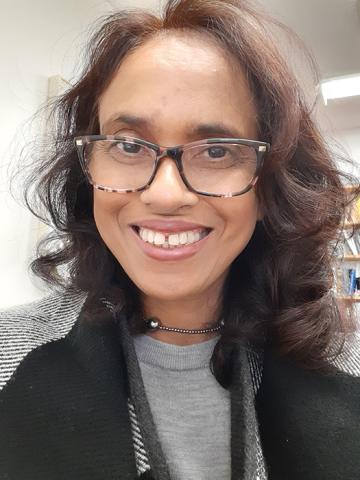Teaching me Hindi did not feel important as it wasn’t relevant to my future as a neo-colonial.

Learning
My name is Roni Michelle Ann Beharry. I am part of the South Asian diaspora; my ancestors went to Trinidad and Tobago as indentured labourers to work the sugar cane, coffee, and cocoa estates after the British emancipated the previously enslaved. In the late 19th and early 20th centuries, the church and state collaboratively worked to assimilate my ancestors through conversion to Christianity and British colonial culture. Born in the late 60s, my people’s language of origin was suppressed in my neo-colonial context. I grieve the loss of my “first” language.
My great-grandfather taught my dad a Christian bhajan, a lullaby, entitled “Mera Chhota Baba.” The song reassures an anxious child that they need not worry; mommy may go away while you sleep, but Jesus is with you, watching over you and caring for you. He hoped that my dad would teach me this lullaby.
Even though we have a copy of the words of the song in English and Hindi, because my parents were not formally instructed in Hindi or were discouraged from teaching me Hindi, I don’t know the song. English was the language of the British Crown, and all formal education was in English, so my parents did not consider it a priority that their children learn Hindi. Teaching me Hindi did not feel important in the late 60s and early 70s as it wasn’t relevant to my future as a neo-colonial. We sang English hymns almost exclusively at church, so bhajans were not a regular part of the hymnody. My parents did not realize that the loss of culture follows the loss of language.
Colonialism has stripped me of the language of my origin, and I grieve that I cannot sing a worship song that has the potential to bring comfort to my sometimes anxious spirit today.
Recently, I was part of an anti-racism workshop, and during one of our sessions, we did a power flower exercise. This exercise invites people to reflect on their power and privilege in relation to their social identities. As part of the exercise, we were asked whether we had a first language other than English. My sense of oppression was exacerbated because I have lost my first language.
I currently serve The United Church of Canada as an ordained minister, and I recently accepted a call at North Bramalea United Church in Brampton, Ontario, as Minister of Discipleship. A number of families from the East Indian/South Asian diaspora choose to worship at this church. Within the first three months of my call, a South Asian woman said to me, “You have no idea how empowering it is to see a South Asian woman preaching and leading in worship.” I realize that this privilege comes with great responsibility. Another South Asian woman disclosed that she hopes for the day when her husband can play the tabla in church. My response to her was let’s work together toward that goal “one faithful day.” I am self-aware that making space for all cultures to authentically express themselves in public worship will require an examination of power and privilege and a willingness to subvert a culture of dominance.
Faith Reflection
Please pray with me:
O God, I pray that you will give wisdom so I can lead my South Asian siblings in mobilizing our social capital separately and alongside other racialized groups to advocate for use of diverse languages and cultural forms in public worship. Help your church to recognize that centring our worship practices around one dominant culture does not align with your work at Pentecost. You sent your Holy Spirit, helping your apostles to proclaim your deeds of power in diverse languages. Holy Spirit, go forth before us and lead us, helping us to do likewise. Amen.
Living It Out
I will know that church is radically welcoming when my current congregation is invited to pray the Lord’s Prayer in their respective first languages. Radical belonging will be actualized when a favourite scripture passage is read in more than one first language. I will know that I belong when South Asian music is included in public worship.
I can still hear in my heart an Elder from my home church in Trinidad singing a bhajan each Sunday, at times stopping to recall words and persevering through the song so that the next generation might not forget the practice of their faith in their language of origin. I am grateful that I have not forgotten the value of preserving and passing on one’s first language. I will persevere.
My heart felt hopeful when a Brazilian member of the church publicly sang one verse of a popular worship song in her first language, Portuguese. If Portuguese was my first language, I would have felt authentically welcomed. Could it be that the walls of White privilege are slowly being deconstructed and channels for connection and intercultural exchange are being formed?
—Roni Beharry (she/her) is an ordained minister with The United Church of Canada who has served in North Bay and in Guelph in Ontario. Currently, she is in ministry in Brampton, Ontario. She has served in faith formation and racial justice for over 20 years. She lives in Burlington, Ontario, with her spouse, Lorne Robertson.